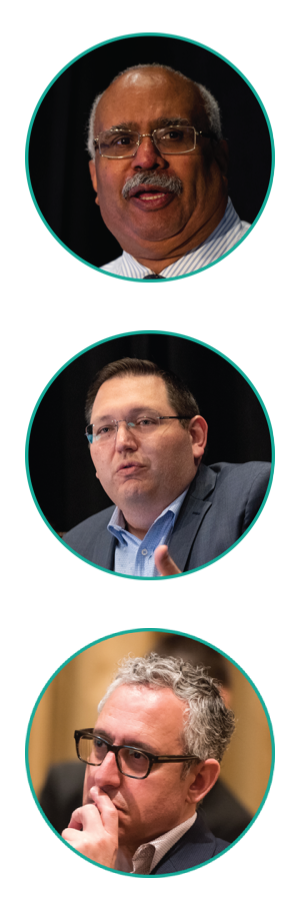Reflections: Public Health Workforce Forum
- By: The Public Health Learning Network
- Date
 This summer, during the Public Health Workforce Forum in New Orleans, we caught up with a few of public health’s most thoughtful and courageous champions to talk about their reflections on the forum and hopes for the future of the workforce–Dr. Georges Benjamin, executive director of the American Public Health Association; Brian Castrucci, executive director of the de Beaumont Foundation; and Bradley Cohen, director of the Boston Public Health Commission Consortium for Professional Development. These conversations have been lightly edited for length and clarity.
This summer, during the Public Health Workforce Forum in New Orleans, we caught up with a few of public health’s most thoughtful and courageous champions to talk about their reflections on the forum and hopes for the future of the workforce–Dr. Georges Benjamin, executive director of the American Public Health Association; Brian Castrucci, executive director of the de Beaumont Foundation; and Bradley Cohen, director of the Boston Public Health Commission Consortium for Professional Development. These conversations have been lightly edited for length and clarity.
What do you think is the most important outcome of the Public Health Workforce Forum?
Dr. Benjamin: I think the biggest potential outcome would be for people to understand the opportunity for collaborative effort to rebuild the workforce in a manner that brings people from multiple disciplines moving in the same direction.
Castrucci: Hopefully, the forum gives us forward momentum to align. Going back to 7,000 strategies to 7,000 places isn’t going to bring us to where we need to be. There is a presidential commission on HIV and obesity, but where is the presidential commission on the Public Health Workforce? We know how to bring attention to this; we just need to actually do it.
Cohen: I think to be able to come together as workforce development professionals, share strategies, push one another and ask one another hard questions, and have the chance to ask colleagues for help in answering the hard questions that we’re asked is very helpful for us to grow as a field.
What suggestion do you have for improving training for the public health workforce?
Castrucci: When you do an investment, you are thoughtful, you look at the data, and you are strategic. Until we can get to that point, our investments are not going to pay off, because we are letting 1,000 flowers bloom instead of investing in the workforce that we want. In order to invest in the workforce, you need to know the workforce you want to have.
Cohen: [We need to] stay connected with one another in sharing strategies and paying attention. We are all in positions of privilege within our organizations. We have power and influence. It is up to us to listen very closely and help raise the voices of those who do not have power or influence.
Dr. Benjamin: [We have to get] enough people with the right training and the resources to do the job. So that means getting people committed to the work and making sure they are properly trained. We channel people in the public health field to quickly become injury experts and MCH experts before they become public health experts. Making sure [those individuals] have the right tools like technological tools and scientific tools so that the work is interesting and they are not necessarily going to be pulled away by the private sector.
How is your organization addressing the needs of the public health workforce and how does that impact public health more broadly in the communities you serve?
Dr. Benjamin: APHA has a strategic plan to make us the healthiest nation. We recognized that we are not the healthiest nation and we now have a better understanding of why we are not. We don’t have universal health care. We are not addressing the social determinants of health. We have had a fractured healthcare system. And, we don’t focus on prevention and wellness as a first option versus fixing people.
Those are the four reasons why we differ from the other nations in the world. Even if we caught up with all of them, we would still want to be healthier, but we are working very hard to build a movement. We are also working hard to strengthen the knowledge base of the workforce as one of our strategic objectives and aligning our resources to support [those current and future needs of the workforce].
Cohen: In Boston, we are focused on creating equity for all residents of the city and developing skills for staff where they can address the root causes of what creates inequities and design programs that respond to those root causes. Every interaction with a community member is an opportunity to learn, so [we are focusing on] building the skills required to listen deeply to the underlying needs of community residents–both what they are expressing explicitly and what we and they observe about their lives.
In many ways, these are not two separate things. All of our employees are also residents of the city. We are all impacted–the people that we love and care about–are all impacted by the same health care challenges and inequities that we talk about in the community. Internally creating pathways for people to grow in the organization, to move into positions of leadership, and an increasing influence is really key. Training prepares staff to move into positions with more responsibility and supports them to be successful once they are in positions of increased responsibility.
Want to see a recap of the Public Health Workforce Forum? Watch the video below.
 Subscribe To Our Communications
Subscribe To Our Communications